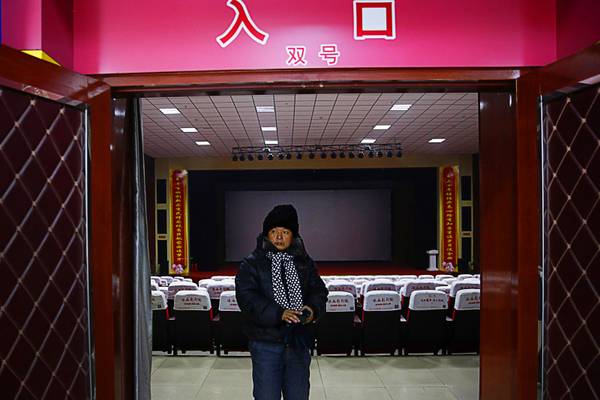 Andy Wong / AP
Andy Wong / AP
In this Dec. 12, 2016, photo, a man walks out from a main screening hall of the Digital Cinema in Zhuolu county in north China’s Hebei province. The brightly decorated 3-D cinema in this town outside Beijing is showing the latest Chinese and Hollywood films, to row after row of empty red seats. So few people come to watch films here that the theater manager rents out the halls to travelling sales companies or music teachers.
Associated Press
Friday, Jan. 13, 2017 | 1:02 a.m.
ZHUOLU TOWN, China — The brightly-decorated 3-D cinema in this town outside Beijing is showing the latest Chinese and Hollywood films, to row after row of empty red seats. So few people come to watch films here that the theater manager rents out the halls to travelling sales companies or music teachers.
China has overtaken the U. S. in terms of the number of its cinema screens, becoming the world’s biggest movie market by that measure. But away from the bigger cities you wouldn’t know it.
In this theater in a county seat near Beijing, the ticket-seller sitting behind the counter with nothing to do and a ticket-collector lying down watching films on his phone are signs something’s amiss with China’s non-stop building of cinemas.
Industry analysts foresee only more and more screens. But Zhuolu’s residents are typical of Chinese who are not in the habit of movie-going, preferring to watch films online for free.
«We don’t have many customers — only a couple on weekdays and a few dozen during the weekends,» said Wang Xudong, the manager of Zhuolu County Digital Cinema, which has three screens and 400 seats for a county of 350,000 people.
«Sometimes we rent the halls out for meetings to earn some money and then we can only break even,» said Wang, who also provides drum kits for cinema hall lessons for amateur musicians. Companies sometimes rent the halls for promotions of products such as health supplements and water dispensers.
China had fewer than 20,000 cinema screens in 2013, but it has now surpassed the U. S., which had 40,759 indoor and drive-in screens as of July, according to the Washington, D. C.-based National Association of Theatre Owners. As of Dec. 20, China had 40,917 screens, according to the national film bureau.
As the most populous country, at 1.4 billion, China’s cinema market still has plenty of room to grow as theater chains expand into smaller cities and rural areas.
Box office takings are still much smaller in China, at more than $6.5 billion in 2015, compared to $11 billion in North America, including cinema advertising revenue.
There are just 23 screens per million Chinese, compared to 125 per million in the U. S., according to IHS Markit, a London-based market researcher.
Analyst David Hancock estimates China’s screen density ratio will grow to about 57 screens per million over the next five to 10 years.
«The country is still under-screened, and there seems to be little reason to stop building screens where there are none,» Hancock said.
China’s countryside had around 3,000 cinemas in 2016, out of 7,000 in the whole country, said Fu Yalong, research director at leading entertainment consultancy EntGroup.
«It takes time to foster the habit among people of going to the cinema,» he said. «This is still a market with potential for development. »
Beijing, with 22 million people, added more than 100 cinemas in 2016, up from about 70 in 2015.
The cinema in Zhuolu, an apple and grape-growing area 160 kilometers (100 miles) away, opened in 2014. It’s surrounded by shops, banks and restaurants operating underneath apartment blocks.
On a recent weekday afternoon, a couple bought two 35-yuan ($5) tickets to watch the Hollywood film «Hacksaw Ridge» and had the whole theater to themselves. That’s equivalent to about the cheapest cinema ticket for sale in Beijing.
Growth in China’s box office takings has begun to slow after years of record-breaking expansion, increasing by just 3.7 percent in 2016 compared with an annual jump of 48.7 percent in 2015. That has pushed back forecasts of when China’s box office sales will overtake North America’s to 2019, from as early as this year.
Limited purchasing power and competition from online viewing are taking a toll. So is the generally mediocre selection of films, like the widely panned 2016 staple «League of Gods,» a fantasy epic starring Jet Li and Fan Bingbing that is based on a 16th-century Chinese novel. Ticket prices have risen after several online ticket platforms stopped giving discounts.
For decades after the Communist Party took power in 1949, state-owned cinemas showed propaganda films starring peasants and soldiers. Even after economic reforms began in the 1980s-90s, cinemas charged as little as 2 mao (3 cents) for showings of both foreign and domestic films.
As China’s economy became more market-oriented, state-operated theaters in places like Zhuolu closed and people lost the cinema-going habit. Companies like real estate conglomerate Wanda Group, which owns the American AMC movie theater company, have led a private cinema chain revolution in large cities.
The new cinema in Zhuolu opened its doors two years ago, more than a decade after the old state-run one was torn down.
Once an avid movie-goer, 66-year-old farmer Zhao Youling has never visited the new cinema just 1.5 kilometers (1 mile) away from his village.
«It isn’t that the ticket is too expensive, it is that I am too poor,» Zhao said.
«I always stay at home and watch TV because it is free,» Zhao said. «I was a movie fan 30 years ago and as far as I can remember I could afford to watch a film almost every week and I loved to watch films featuring the lives of farmers or stories in the countryside.






